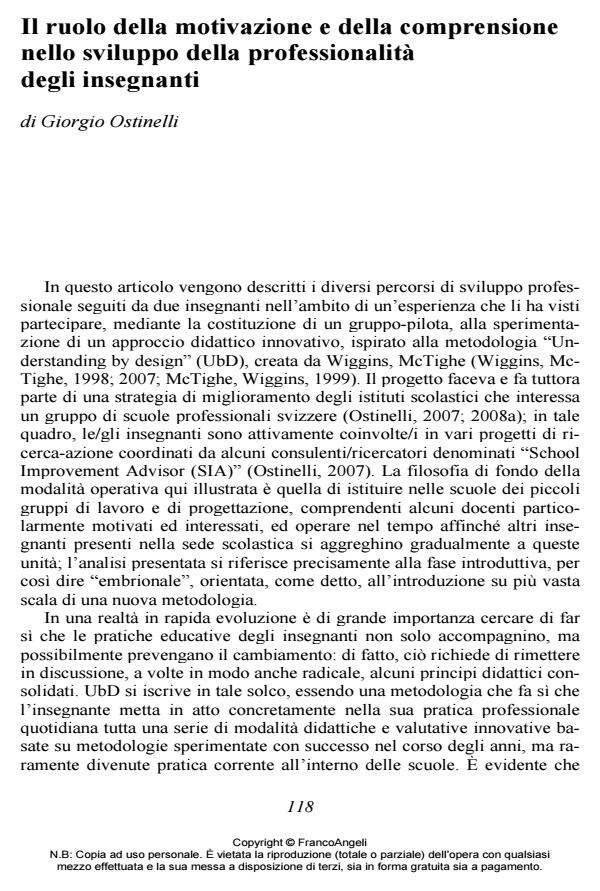Il ruolo della motivazione e della comprensione nello sviluppo della professionalità degli insegnanti
Titolo Rivista EDUCATIONAL REFLECTIVE PRACTICES
Autori/Curatori Giorgio Ostinelli
Anno di pubblicazione 2012 Fascicolo 2012/1
Lingua Italiano Numero pagine 22 P. 118-139 Dimensione file 421 KB
DOI 10.3280/ERP2012-001008
Il DOI è il codice a barre della proprietà intellettuale: per saperne di più
clicca qui
Qui sotto puoi vedere in anteprima la prima pagina di questo articolo.
Se questo articolo ti interessa, lo puoi acquistare (e scaricare in formato pdf) seguendo le facili indicazioni per acquistare il download credit. Acquista Download Credits per scaricare questo Articolo in formato PDF

FrancoAngeli è membro della Publishers International Linking Association, Inc (PILA)associazione indipendente e non profit per facilitare (attraverso i servizi tecnologici implementati da CrossRef.org) l’accesso degli studiosi ai contenuti digitali nelle pubblicazioni professionali e scientifiche
This paper depicts the different paths followed by two teachers in the development of their professionalism, through their participation to a pilot group experimenting a fairly innovative teaching approach, inspired to Wiggins & McTighe’s "Understanding by design (UbD)" methodology (Wiggins & McTighe, 1998; McTighe & Wiggins, 1999; Wiggins & McTighe, 2007). UbD is a constructivist way to organize teaching, involving significant changes to usual teaching practices. The project is part of a wider school improvement strategy actually taking place in a group of Swiss vocational schools (Ostinelli, 2007, 2008a), whereby teachers are supported by some School Improvement Advisor/researchers (SIA). The SIA can be roughly described as a figure being at the same time an advisor, a researcher and a critical friend. The key idea is, after the creation of some pilot groups, to "aggregate" other teachers and to disseminate the experience to other schools: the present article deals with the first, embryonic stage. In today's world, is quite important for teachers not only to accompany, but also to be able to prevent the change taking place inside schools; in this context, an evolution in their teaching practices is decisive. UbD can be a good path to follow in this journey, but, like various innovations, can be also difficult, either for the teacher and the SIA. This article will try to explain why one of the teachers assimilated the new methodology, improving his professionalism, while the other didn’t. Why and how, in some circumstances, a lack of understanding of the situa- tion experienced can drive to negative consequences to the development of innovative teaching skills? Which is the role of motivation in this context? In order to try to give some answers to these questions, both teachers were firstly interviewed, and then a motivational test was administered to them. The collected informations proved useful for a better understanding of the dynamics underlying the described experience.
- Between university and school: the School Improvement Advisor/researcher (SIA) Giorgio Ostinelli, in International Journal of Leadership in Education /2019 pp.189
DOI: 10.1080/13603124.2017.1321784
Giorgio Ostinelli, Il ruolo della motivazione e della comprensione nello sviluppo della professionalità degli insegnanti in "EDUCATIONAL REFLECTIVE PRACTICES" 1/2012, pp 118-139, DOI: 10.3280/ERP2012-001008